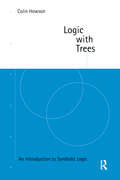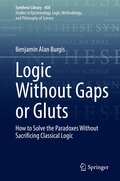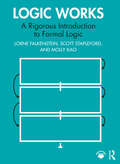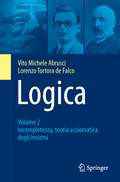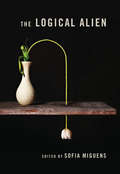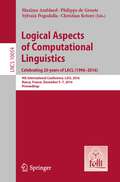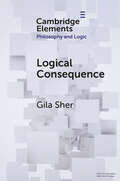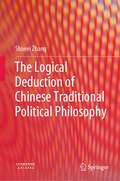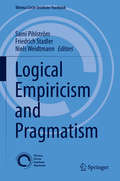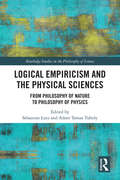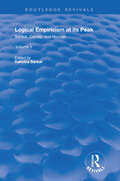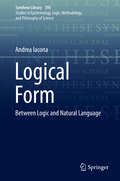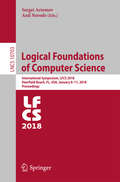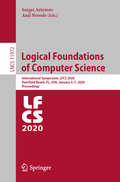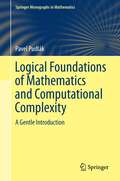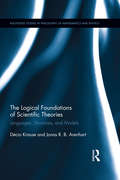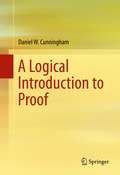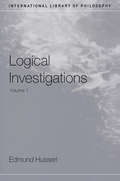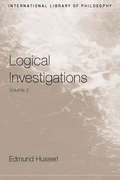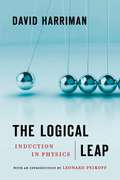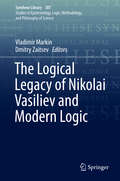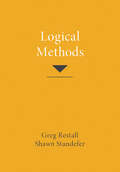- Table View
- List View
Logic with Trees: An Introduction to Symbolic Logic
by Colin HowsonFirst published in 1997. Routledge is an imprint of Taylor & Francis, an informa company.
Logic Without Gaps or Gluts: How to Solve the Paradoxes Without Sacrificing Classical Logic (Synthese Library #458)
by Benjamin Alan BurgisThis book offers a defense against non-classical approaches to the paradoxes. The author argues that, despite appearances, the paradoxes give no reason at all to reject classical logic. In fact, he believes classical solutions fare better than non-classical ones with respect to key tests like Curry’s Paradox, a Liar-like paradox that dialetheists are forced to solve in a way totally disjoint from their solution to the Liar. Graham Priest’s In Contradiction was the first major work that advocated the use of non-classical approaches. Since then, these views have moved into the philosophical mainstream. Much of this movement is fueled by a widespread sense that these logically heterodox solutions get to the real nub of the issue. They lack the ad hoc feel of many other solutions to the paradoxes. The author believes that it's long past time for a response to these attacks against classical orthodoxy. He presents a non-logically-revisionary solution to the paradoxes. This title offers a literal way of cashing out the disquotation metaphor. While the details of the view are novel, the idea has a pre-history in the relevant literature. The author examines objections in detail. He rejects each in turn and concludes by comparing the virtues of his logically orthodox approach with those of the paraconsistent and paracomplete competition.
Logic Works: A Rigorous Introduction to Formal Logic
by Lorne Falkenstein Scott Stapleford Molly KaoLogic Works is a critical and extensive introduction to logic. It asks questions about why systems of logic are as they are, how they relate to ordinary language and ordinary reasoning, and what alternatives there might be to classical logical doctrines. The book covers classical first-order logic and alternatives, including intuitionistic, free, and many-valued logic. It also considers how logical analysis can be applied to carefully represent the reasoning employed in academic and scientific work, better understand that reasoning, and identify its hidden premises. Aiming to be as much a reference work and handbook for further, independent study as a course text, it covers more material than is typically covered in an introductory course. It also covers this material at greater length and in more depth with the purpose of making it accessible to those with no prior training in logic or formal systems. Online support material includes a detailed student solutions manual with a running commentary on all starred exercises, and a set of editable slide presentations for course lectures. Key Features Introduces an unusually broad range of topics, allowing instructors to craft courses to meet a range of various objectives Adopts a critical attitude to certain classical doctrines, exposing students to alternative ways to answer philosophical questions about logic Carefully considers the ways natural language both resists and lends itself to formalization Makes objectual semantics for quantified logic easy, with an incremental, rule-governed approach assisted by numerous simple exercises Makes important metatheoretical results accessible to introductory students through a discursive presentation of those results and by using simple case studies
Logica: Volume 2 - Incompletezza, teoria assiomatica degli insiemi (UNITEXT #111)
by Vito Michele Abrusci Lorenzo Tortora de FalcoL'opera si propone come testo di riferimento per acquisire una solida preparazione specialistica nella Logica, presentando in maniera rigorosa ed innovativa argomenti tradizionalmente affrontati nei corsi universitari di secondo livello. Questo secondo volume, che completa l'opera, presenta le basi della teoria della ricorsività, l'aritmetica di Peano ed i teoremi di incompletezza, gli assiomi della teoria assiomatica degli insiemi di Zermelo-Fraenkel e la teoria degli ordinali e dei cardinali che ne deriva.
The Logical Alien: Conant And His Critics
by Sofia MiguensIs our logical form of thought merely one among many, or must it be the form of thought as such? From Kant to Wittgenstein, philosophers have wrestled with variants of this question. This volume brings together nine distinguished thinkers on the subject, including James Conant, author of the seminal paper “The Search for Logically Alien Thought.”
Logical Aspects of Computational Linguistics. Celebrating 20 Years of LACL: 9th International Conference, LACL 2016, Nancy, France, December 5-7, 2016, Proceedings (Lecture Notes in Computer Science #10054)
by Maxime Amblard Philippe De Groote Sylvain Pogodalla Christian RetoréEdited under the auspices of the Association of Logic, Language andInformation (FoLLI), this book constitutes the refereed proceedings ofthe 20th anniversary of the International Conference on LogicalAspects of Computational Linguistics, LACL 2016, held in LORIA Nancy,France, in December 2016. The 19 contributed papers, presentedtogether with 4 invited papers and 6 abstracts, were carefullyreviewed and selected from 38 submissions. The focus of the conferenceis the use of type theoretic, proof theoretic, and model theoreticmethods for describing and formalising natural language syntax,semantics, and pragmatics as well as the implementation of thecorresponding tools.
Logical Consequence (Elements in Philosophy and Logic)
by Gila SherTo understand logic is, first and foremost, to understand logical consequence. This Element provides an in-depth, accessible, up-to-date account of and philosophical insight into the semantic, model-theoretic conception of logical consequence, its Tarskian roots, and its ideas, grounding, and challenges. The topics discussed include: (i) the passage from Tarski's definition of truth (simpliciter) to his definition of logical consequence, (ii) the need for a non-proof-theoretic definition, (iii) the idea of a semantic definition, (iv) the adequacy conditions of preservation of truth, formality, and necessity, (v) the nature, structure, and totality of models, (vi) the logicality problem that threatens the definition of logical consequence (the problem of logical constants), (vii) a general solution to the logicality, formality, and necessity problems/challenges, based on the isomorphism-invariance criterion of logicality, (viii) philosophical background and justification of the isomorphism-invariance criterion, and (ix) major criticisms of the semantic definition and the isomorphism-invariance criterion.
The Logical Deduction of Chinese Traditional Political Philosophy
by Shiwei ZhangThis book presents a panoramic and extensive exploration of Chinese political philosophy, examining key political problems of the past, and the thinkers who addressed them. As the reader will discover, China’s traditional political philosophy is one with distinctive national characteristics and ideals. Therefore, the book helps to clarify the evolution of Chinese political thought, while also investigating fundamental political issues throughout the country’s history. The book offers a unique resource for researchers and graduate students in the fields of political science, philosophy, and history, as well as ordinary readers who are interested in China’s traditional and political culture.
Logical Empiricism and Naturalism: Neurath and Carnap’s Metatheory of Science (Vienna Circle Institute Library)
by Joseph BentleyThis text provides an extensive exploration of the relationship between the thought of Otto Neurath and Rudolf Carnap, providing a new argument for the complementarity of their mature philosophies as part of a collaborative metatheory of science. In arguing that both Neurath and Carnap must be interpreted as proponents of epistemological naturalism, and that their naturalisms rest on shared philosophical ground, it is also demonstrated that the boundaries and possibilities for epistemological naturalism are not as restrictive as Quinean orthodoxy has previously suggested. Both building on and challenging the scholarship of the past four decades, this naturalist reading of Carnap also provides a new interpretation of Carnap’s conception of analyticity, allowing for a refutation of the Quinean argument for the incompatibility of naturalism and the analytic/synthetic distinction. In doing so, the relevance and potential importance of their scientific meta-theory for contemporary questions in the philosophy of science is demonstrated.This text appeals to students and researchers working on Logical Empiricism, Quine, the history of analytic philosophy and the history of philosophy of science, as well as proponents of naturalized epistemology.
Logical Empiricism and Pragmatism
by Sami Pihlström Friedrich Stadler Niels WeidtmannThis book explores the complexity of two philosophical traditions, extending from their origins to the current developments in neopragmatism. Chapters deal with the first encounters of these traditions and beyond, looking at metaphysics and the Vienna circle as well as semantics and the principle of tolerance. There is a general consensus that North-American (neo-)pragmatism and European Logical Empiricism were converging philosophical traditions, especially after the forced migration of the European Philosophers. But readers will discover a pluralist image of this relation and interaction with an obvious family resemblance. This work clarifies and specifies the common features and differences of these currents since the beginning of their mutual scientific communication in the 19th century. The book draws on collaboration between authors and philosophers from Vienna, T#65533;bingen, and Helsinki, and their networks. It will appeal to philosophers, scholars in the history of philosophy, philosophers of science, pragmatists and beyond.
Logical Empiricism and the Physical Sciences: From Philosophy of Nature to Philosophy of Physics (Routledge Studies in the Philosophy of Science)
by Sebastian Lutz; Adam Tamas TubolyThis volume has two primary aims: to trace the traditions and changes in methods, concepts, and ideas that brought forth the logical empiricists’ philosophy of physics and to present and analyze the logical empiricists’ various and occasionally contrary ideas about the physical sciences and their philosophical relevance. These original chapters discuss these developments in their original contexts and social and institutional environments, thus showing the various fruitful conceptions and philosophies behind the history of 20th-century philosophy of science. Logical Empiricism and the Natural Sciences is divided into three thematic sections. Part I surveys the influences on logical empiricism’s philosophy of science and physics. It features chapters on Maxwell’s role in the worldview of logical empiricism, on Reichenbach’s account of objectivity, on the impact of Poincaré on Neurath’s early views on scientific method, Frank’s exchanges with Einstein about philosophy of physics, and on the forgotten role of Kurt Grelling. Part II focuses on specific physical theories, including Carnap’s and Reichenbach’s positions on Einstein’s theory of general relativity, Reichenbach’s critique of unified field theory, and the logical empiricists’ reactions to quantum mechanics. The third and final group of chapters widens the scope to philosophy of science and physics in general. It includes contributions on von Mises’ frequentism; Frank’s account of concept formation and confirmation; and the interrelations between Nagel’s, Feigl’s, and Hempel’s versions of logical empiricism. This book offers a comprehensive account of the logical empiricists’ philosophy of physics. It is a valuable resource for researchers interested in the history and philosophy of science, philosophy of physics, and the history of analytic philosophy.
Logical Empiricism at Its Peak: Schlick, Carnap, and Neurath (Science And Philosophy In The Twentieth Century: Basic Works Of Logical Empiricism Ser. #2)
by Sahotra Sarkar Rudolf Carnap Maria Neurath Moritz SchlickFirst Published in 1996. This volume reprints pieces from the Vienna Circle period between the manifesto and the adoption of semantics, as well as two commentaries. During this period, the logical empiricists were the most ambitious and the most confident about the success of their enterprise. The first section consists of four ideological classics, The second section reprints three papers on physicalism. The third section consists of three papers on logic and the fourth on reprints three papers on truth, induction, and confirmation.
Logical Fictions in Medieval Literature and Philosophy
by Virginie GreeneIn the twelfth and thirteenth centuries, new ways of storytelling and inventing fictions appeared in the French-speaking areas of Europe. This new art still influences our global culture of fiction. Virginie Greene explores the relationship between fiction and the development of neo-Aristotelian logic during this period through a close examination of seminal literary and philosophical texts by major medieval authors, such as Anselm of Canterbury, Abélard, and Chrétien de Troyes. This study of Old French logical fictions encourages a broader theoretical reflection about fiction as a universal human trait and a defining element of the history of Western philosophy and literature. Additional close readings of classical Greek philosophers Plato and Aristotle, and modern analytic philosophy including the work of Bertrand Russell and Rudolf Carnap, demonstrate peculiar traits of Western rationalism and expose its ambivalent relationship to fiction.
Logical Form: Between Logic and Natural Language (Synthese Library #393)
by Andrea IaconaLogical form has always been a prime concern for philosophers belonging to the analytic tradition. For at least one century, the study of logical form has been widely adopted as a method of investigation, relying on its capacity to reveal the structure of thoughts or the constitution of facts. This book focuses on the very idea of logical form, which is directly relevant to any principled reflection on that method. Its central thesis is that there is no such thing as a correct answer to the question of what is logical form: two significantly different notions of logical form are needed to fulfill two major theoretical roles that pertain respectively to logic and to semantics. This thesis has a negative and a positive side. The negative side is that a deeply rooted presumption about logical form turns out to be overly optimistic: there is no unique notion of logical form that can play both roles. The positive side is that the distinction between two notions of logical form, once properly spelled out, sheds light on some fundamental issues concerning the relation between logic and language.
Logical Foundations of Computer Science
by Sergei Artemov Anil NerodeThis book constitutes the refereed proceedings of the International Symposium on Logical Foundations of Computer Science, LFCS 2007, held in New York, NY, USA in June 2007. The volume presents 36 revised refereed papers that address all current aspects of logic in computer science.
Logical Foundations of Computer Science: International Symposium, LFCS 2020, Deerfield Beach, FL, USA, January 4–7, 2020, Proceedings (Lecture Notes in Computer Science #11972)
by Sergei Artemov Anil NerodeThis book constitutes the refereed proceedings of the International Symposium on Logical Foundations of Computer Science, LFCS 2020, held in Deerfield Beach, FL, USA, in January 2020. The 17 revised full papers were carefully reviewed and selected from 30 submissions. The scope of the Symposium is broad and includes constructive mathematics and type theory; homotopy type theory; logic, automata, and automatic structures; computability and randomness; logical foundations of programming; logical aspects of computational complexity; parameterized complexity; logic programming and constraints; automated deduction and interactive theorem proving; logical methods in protocol and program verification; logical methods in program specification and extraction; domain theory logics; logical foundations of database theory; equational logic and term rewriting; lambda and combinatory calculi; categorical logic and topological semantics; linear logic; epistemic and temporal logics; intelligent and multiple-agent system logics; logics of proof and justification; non-monotonic reasoning; logic in game theory and social software; logic of hybrid systems; distributed system logics; mathematical fuzzy logic; system design logics; other logics in computer science.
Logical Foundations of Mathematics and Computational Complexity
by Pavel PudlákThe two main themes of this book, logic and complexity, are both essential for understanding the main problems about the foundations of mathematics. Logical Foundations of Mathematics and Computational Complexity covers a broad spectrum of results in logic and set theory that are relevant to the foundations, as well as the results in computational complexity and the interdisciplinary area of proof complexity. The author presents his ideas on how these areas are connected, what are the most fundamental problems and how they should be approached. In particular, he argues that complexity is as important for foundations as are the more traditional concepts of computability and provability. Emphasis is on explaining the essence of concepts and the ideas of proofs, rather than presenting precise formal statements and full proofs. Each section starts with concepts and results easily explained, and gradually proceeds to more difficult ones. The notes after each section present some formal definitions, theorems and proofs. Logical Foundations of Mathematics and Computational Complexity is aimed at graduate students of all fields of mathematics who are interested in logic, complexity and foundations. It will also be of interest for both physicists and philosophers who are curious to learn the basics of logic and complexity theory.
The Logical Foundations of Scientific Theories: Languages, Structures, and Models (Routledge Studies in the Philosophy of Mathematics and Physics)
by Decio Krause Jonas R.B. ArenhartThis book addresses the logical aspects of the foundations of scientific theories. Even though the relevance of formal methods in the study of scientific theories is now widely recognized and regaining prominence, the issues covered here are still not generally discussed in philosophy of science. The authors focus mainly on the role played by the underlying formal apparatuses employed in the construction of the models of scientific theories, relating the discussion with the so-called semantic approach to scientific theories. The book describes the role played by this metamathematical framework in three main aspects: considerations of formal languages employed to axiomatize scientific theories, the role of the axiomatic method itself, and the way set-theoretical structures, which play the role of the models of theories, are developed. The authors also discuss the differences and philosophical relevance of the two basic ways of aximoatizing a scientific theory, namely Patrick Suppes’ set theoretical predicates and the "da Costa and Chuaqui" approach. This book engages with important discussions of the nature of scientific theories and will be a useful resource for researchers and upper-level students working in philosophy of science.
A Logical Introduction to Proof
by Daniel W. CunninghamThe book is intended for students who want to learn how to prove theorems and be better prepared for the rigors required in more advance mathematics. One of the key components in this textbook is the development of a methodology to lay bare the structure underpinning the construction of a proof, much as diagramming a sentence lays bare its grammatical structure. Diagramming a proof is a way of presenting the relationships between the various parts of a proof. A proof diagram provides a tool for showing students how to write correct mathematical proofs.
Logical Investigations Volume 1 (International Library of Philosophy)
by Dermot Moran Edmund HusserlEdmund Husserl is the founder of phenomenology and the Logical Investigations is his most famous work. It had a decisive impact on twentieth century philosophy and is one of few works to have influenced both continental and analytic philosophy.This is the first time both volumes have been available in paperback. They include a new introduction by Dermot Moran, placing the Investigations in historical context and bringing out their contemporary philosophical importance.These editions include a new preface by Sir Michael Dummett.
Logical Investigations Volume 2 (International Library of Philosophy)
by Edmund HusserlEdmund Husserl is the founder of phenomenology and the Logical Investigations is his most famous work. It had a decisive impact on twentieth century philosophy and is one of few works to have influenced both continental and analytic philosophy.This is the first time both volumes have been available in paperback. They include a new introduction by Dermot Moran, placing the Investigations in historical context and bringing out their contemporary philosophical importance.These editions include a new preface by Sir Michael Dummett.
The Logical Leap: Induction in Physics
by David HarrimanA groundbreaking solution to the problem of induction, based on Ayn Rand's theory of concepts. Inspired by and expanding on a series of lectures presented by Leonard Peikoff, David Harriman presents a fascinating answer to the problem of induction-the epistemological question of how we can know the truth of inductive generalizations. Ayn Rand presented her revolutionary theory of concepts in her book Introduction to Objectivist Epistemology. As Dr. Peikoff subsequently explored the concept of induction, he sought out David Harriman, a physicist who had taught philosophy, for his expert knowledge of the scientific discovery process. Here, Harriman presents the result of a collaboration between scientist and philosopher. Beginning with a detailed discussion of the role of mathematics and experimentation in validating generalizations in physics-looking closely at the reasoning of scientists such as Galileo, Kepler, Newton, Lavoisier, and Maxwell-Harriman skillfully argues that the inductive method used in philosophy is in principle indistinguishable from the method used in physics. .
The Logical Legacy of Nikolai Vasiliev and Modern Logic
by Vladimir Markin Dmitry ZaitsevThis volume offers a wide range of both reconstructions of Nikolai Vasiliev's original logical ideas and their implementations in the modern logic and philosophy. A collection of works put together through the international workshop "Nikolai Vasiliev's Logical Legacy and the Modern Logic," this book also covers foundations of logic in the light of Vasiliev's contradictory ontology. Chapters range from a look at the Heuristic and Conceptual Background of Vasiliev's Imaginary Logic to Generalized Vasiliev-style Propositions. It includes works which cover Imaginary and Non-Aristotelian Logics, Inconsistent Set Theory and the Expansion of Mathematical Thinking, Plurivalent Logic, and the Impact of Vasiliev's Imaginary Logic on Epistemic Logic. The Russian logician, Vasiliev, was widely recognized as one of the forerunners of modern non-classical logic. His "imaginary logic" developed in some of his work at the beginning of 20th century is often considered to be one of the first systems of paraconsistent and multi-valued logic. The novelty of his logical project has opened up prospects for modern logic as well as for non-classical science in general. This volume contains a selection of papers written by modern specialists in the field and deals with various aspects of Vasiliev's logical ideas. The logical legacy of Nikolai Vasiliev can serve as a promising source for developing an impressive range of philosophical interpretations, as it marries promising technical innovations with challenging philosophical insights.
Logical Methods
by Greg Restall Shawn StandeferAn accessible introduction to philosophical logic, suitable for undergraduate courses and above.Rigorous yet accessible, Logical Methods introduces logical tools used in philosophy—including proofs, models, modal logics, meta-theory, two-dimensional logics, and quantification—for philosophy students at the undergraduate level and above. The approach developed by Greg Restall and Shawn Standefer is distinct from other texts because it presents proof construction on equal footing with model building and emphasizes connections to other areas of philosophy as the tools are developed. Throughout, the material draws on a broad range of examples to show readers how to develop and master tools of proofs and models for propositional, modal, and predicate logic; to construct and analyze arguments and to find their structure; to build counterexamples; to understand the broad sweep of formal logic&’s development in the twentieth and twenty-first centuries; and to grasp key concepts used again and again in philosophy. This text is essential to philosophy curricula, regardless of specialization, and will also find wide use in mathematics and computer science programs. Features:An accessible introduction to proof theory for readers with no background in logicCovers proofs, models, modal logics, meta-theory, two-dimensional logics, quantification, and many other topicsProvides tools and techniques of particular interest to philosophers and philosophical logiciansFeatures short summaries of key concepts and skills at the end of each chapterOffers chapter-by-chapter exercises in two categories: basic, designed to reinforce important ideas; and challenge, designed to push students&’ understanding and developing skills in new directions
Logical Modalities from Aristotle to Carnap
by Max CresswellInterest in the metaphysics and logic of possible worlds goes back at least as far as Aristotle, but few books address the history of these important concepts. This volume offers new essays on the theories about the logical modalities (necessity and possibility) held by leading philosophers from Aristotle in ancient Greece to Rudolf Carnap in the twentieth century. The story begins with an illuminating discussion of Aristotle's views on the connection between logic and metaphysics, continues through the Stoic and mediaeval (including Arabic) traditions, and then moves to the early modern period with particular attention to Locke and Leibniz. The views of Kant, Peirce, C. I. Lewis and Carnap complete the volume. Many of the essays illuminate the connection between the historical figures studied, and recent or current work in the philosophy of modality. The result is a rich and wide-ranging picture of the history of the logical modalities.
